FSAI renews advice to boil imported frozen berries

FSAI reissues advice after a new report shows frozen berries contaminated with hepatitis A could still be circulating in the food chain
8 September 2014
The Food Safety Authority of Ireland (FSAI) today (8 September) advised consumers to continue to boil all imported frozen berries for at least one minute prior to consumption. The FSAI stated that it is re-enforcing this advice which was originally provided last year when a food poisoning outbreak of hepatitis A virus linked to imported frozen berries was first identified in Ireland and subsequently transpired to be a multi-state European outbreak.
The association is renewing its advice following the publication of a report into the European-wide investigation into the outbreak which has found that contaminated frozen berries could still be circulating in the food chain. Also this month, a few Irish cases of hepatitis A have been reported to the FSAI which cannot be explained by travel abroad and investigations are underway to establish if there may be a link with contaminated imported frozen berries or other foods.
The European-wide trace-back investigation, which the FSAI was part of, was coordinated by the European Food Safety Authority. The outbreak was first identified in May 2013, when Germany reported cases with a travel history to Italy and Italy identified a national increase in the number of hepatitis A cases. To date 1,440 cases have been reported in 12 European countries, 331 of which have been confirmed by genotyping. The majority of cases were reported in Italy. Twenty five cases were reported in Ireland, 21 of which were confirmed.
Hepatitis A contamination of mixed berries and mixed berry containing products was identified in three countries, Italy, France and Norway. Following the European-wide trace-back investigation, Bulgarian blackberries and Polish redcurrants have been identified as the most common ingredient in the food consumed by affected people. Poland is the largest producer of redcurrants in Europe, and Bulgaria is a major exporter of frozen blackberries. No single point source of contamination has been identified; however, 12 food operators have been identified with links to cases and batches in five of the countries affected.
The association has said food businesses using frozen imported berries need to ensure that the berries they use are sourced from reputable suppliers operating effective food safety management systems and comprehensive traceability systems.If such assurances are not available, the imported berries should be boiled for one minute before being used in foods to eliminate or reduce the risk from foodborne viruses and bacteria.



 Print
Print




Fans 0
Followers